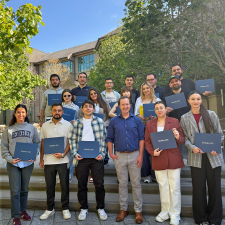The Anti-Corruption Civil Court continued today, November 28, examining the claim for the seizure of Gevorg Kostanyan’s allegedly illegally obtained property, presided over by Judge Lili Drmeyan.
According to Iravaban.net, the preliminary court session was attended by Prosecutor General’s Office representatives Nelli Ter-Torosyan and Artur Karapetyan, and respondent Gevorg Kostanyan’s representative Varazdat Asatryan. Although properly notified, respondent Lilit Kostanyan’s representative Hayk Jhangiryan and respondents Armen Davtyan and Tereza Gevorgyan did not appear.
The judge cited Asatryan’s previous session’s reasoning that he hadn’t had time to study the materials and asked if Asatryan had managed to study them now.
In response, Asatryan noted that he hadn’t been provided with bank account analyses by the plaintiff and there was an issue with getting a complete picture.
“In all my cases, mostly, bank accounts have been provided, except for this case. Without them, we see an issue in effectively revealing factual data. Through numerous sessions, we’ve concluded that baseline data is important. When data is presented, it usually consists of 2 parts – banks and the main part. Now we don’t have the banks part. I would ask the party to provide these baseline data as well, because without it, it will be incomprehensible for both the court and us, and could ultimately lead to the rejection of the claim, as the plaintiff’s legal approaches or logic will be unclear regarding how these numerical values were combined in the case. In other words, besides legal analysis, we’ll have to resort to assumptions or guessing about which line was used to confirm which facts,” Asatryan added.
The lawyer assured the court that the absence of banking data makes it impossible to get a complete picture of the data.
The judge suggested clarifying unclear issues through questions and asked the prosecutor to explain the logic behind the table’s composition. According to the judge, perhaps the data is contained in the materials and could be found upon examination.
“The claim was accompanied by factual data that also contains information considered banking secrets. The provided data includes information about bank payments. The competent authority has presented the working file based on which the claim was filed with the court. The competent authority doesn’t have a specific example to follow when compiling files,” said Ter-Torosyan.
To Asatryan’s question whether this file contains data about bank transfers and their identification, Ter-Torosyan responded that payments are included, bank transfers are presented in the “payments” section, and the “comments” section includes the names of banks where deposits were made.
The prosecution’s economist Karapetyan added that transfer data is available: “You can open the file and see who transferred how much money to Mr. Kostanyan. Similarly, you can see the expenses. In the previous court session, we provided what we agreed to provide. During the evidence examination phase, we can examine the data and find answers to questions.”
Asatryan noted that during the evidence examination phase, they first need to understand which are the pieces of evidence, what fact each piece of evidence confirms, or how that evidence is manifested.
In response to Asatryan’s questions, Karapetyan explained what data they placed in which field of the table. According to Karapetyan, since Gevorg Kostanyan did not engage in business activities, his legal income was calculated from salary, loans, and overdrafts. Any other transfer that wasn’t identified was considered an illegal entry. The data in the file was presented by years, according to which any purchase exceeding annual income and consumer basket was considered illegal income. The percentage ratio was calculated based on how much Kostanyan’s expenses exceeded his income.
Ter-Torosyan assured that no data would remain unexplained and all calculations were obtained through the study of bank accounts.
According to Asatryan, the claim doesn’t explain how they concluded there was a gap in legal income, to which Karapetyan responded that calculations were made using annual calculation logic and it’s impossible to present them using daily calculation logic.
Asatryan presented a motion to the court requesting time for data examination, which the court granted.
The next court session in this case will take place on January 23, 2025, at 11:00.















